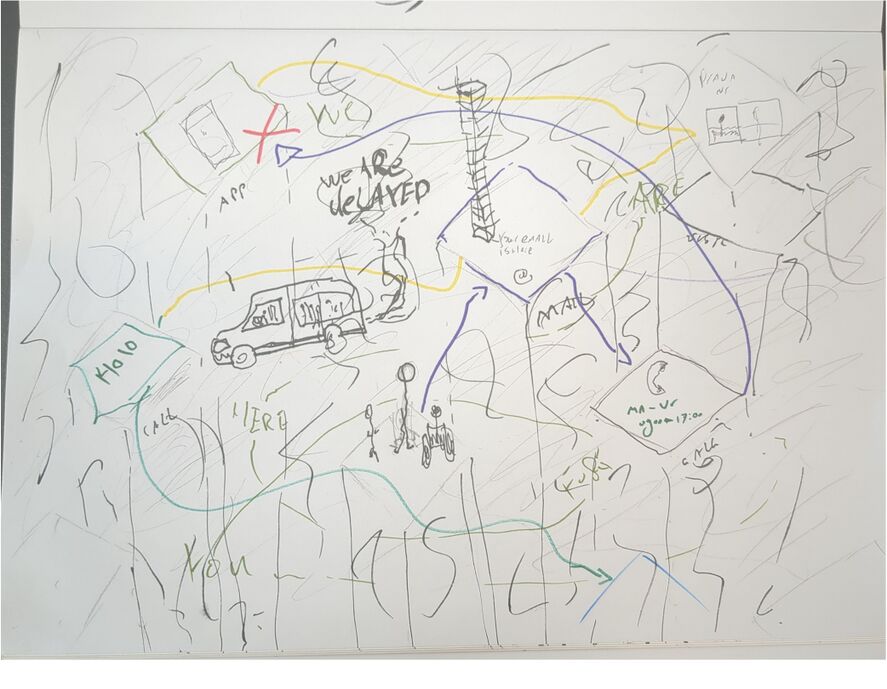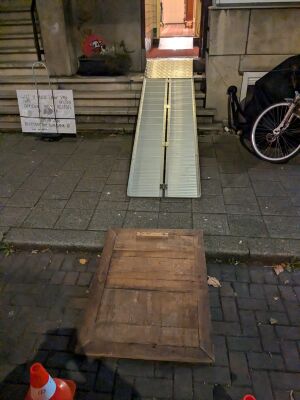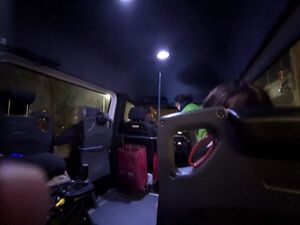Lor.ensoDraftSteveSuggests
[04-02-25 note to Steve: This is my progress: more drawings, first attempt to include Ghent stories and also some more elements, didn't have a chance yet to add Mania's proposed edits and some other things from our talk + I still need to add the proper format, but I hope this is a great new version. Enjoy!]
My edits and suggestions are in this colour and my small edits are in bold GENERAL COMMENTS: this really establishes the drawings as leading the text; you also develop your own position towards accessibility here (situated and particular as opposed to abstract and 'academic'). Having done this, the next chapter can introduce a new drawing and transcription which continues to express the ideals you outline in your reflections on the Ghent experience, and which you outline in your introduction. Note: you have about 5000 words, think about what you want to add (2000 words). It might be more manageable to go over the word limit a bit and shave some words off in the edit.
previous suggestionsLorenzoThesisDraftSteveSuggests,
Contextures, a thesis by Lor.enso
Thesis submitted to: Piet Zwart Institute, Willem de Kooning Academy, in partial fulfilment of the requirements for the final examination for the degree of:
Master of Arts in Fine Art & Design: Experimental Publishing (XPub).
Adviser: Steve Rushton
Second Reader: [**]
Word count: [approx 5000 (feb 25)]
Introduction
Traveling around the city of Rotterdam with my brother, who is in a wheelchair, has made me aware of the architectural, cultural and bureaucratic limits that define our movements. In this Thesis I will reflect upon, (de)construct and criticize Rotterdam. I will reflect on Rotterdam in contrast to the utopian postcard realities that I experience in the city. In this text called Contextures, I develop a "counter-mapping" [1] practice in relation to the issue of accessibility in Rotterdam. This will take the form of the transcription of a series of drawings which I made whilst writing Contextures. I will also use my knowledge and experience in world building with 3D software. [2]
The text will be structured by the following themes, each of which represents one of the multiple obstacles to getting around.
Socially - Personal, Affordable, Family, Housing
Accessibly - Disability, Information provision, infrastructures
Bureaucratically - Protocols of local municipal / governments
Architecturally - Buildings, ways, pavements, roads, streets
Virtually - Imagery, impression, media, softwares, simulation, games
Culturally - budget cuts, false iconism, counterculture, grassroots, community, festivals/gigs/events
I think you should mention ADHD and PDDNOS here, because this informs the reader's understanding of how you read the issues central to the thesis. You mention it, but it is currently buried in the Ghent-Constant text (and footnote 17).
These issues become invisible. When people do not see them. they do not exist.
Chapter Outline
The chapters of Contextures group the above into pairs:
- Socially - Accessibly / (un)Familiar barriers, social thresholds and unmeant ignorance I refuse to allow myself to fall in a pit of despair. This is a healthy reflection on the topics; reacting honestly to a complex of issues in search for (alternative) mechanism.
- Virtually - Architecturally / Innovation and Virtual Tools as development or demolition of reality
- Bureaucratically - Culturally / Zoning: friction between counter culture and bureaucracy, false iconism vs community
DRAWING ONE. GET AROUND / Socially - Accessibly / (un)Familiar barriers, social thresholds and unmeant ignorance
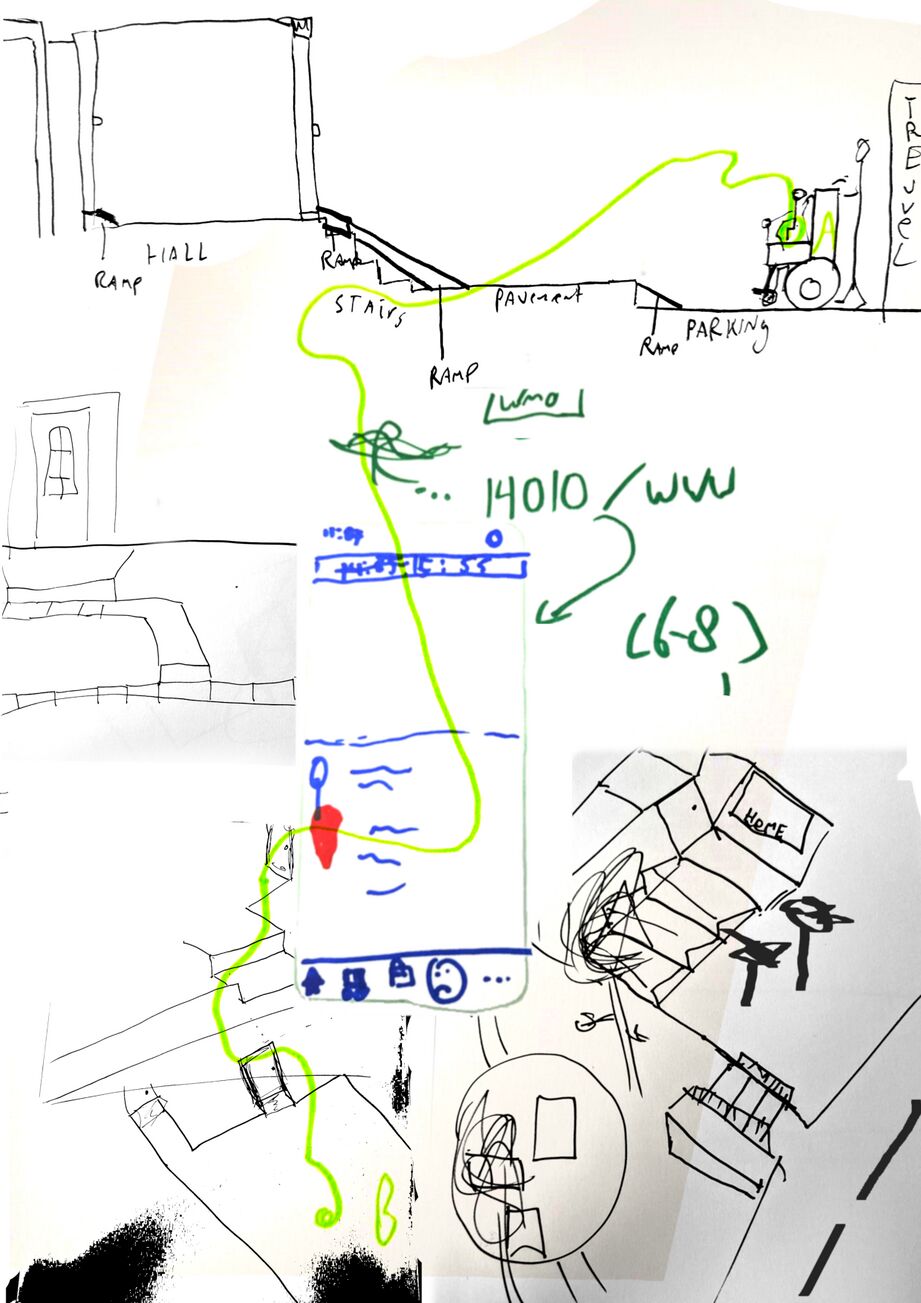
Socially - Accessibly / (un)Familiar barriers, social thresholds and unmeant ignorance
In this chapter I aim to show the preconceptions that are often there about the multiple obstacles to and how these become invisible when people are unaware. When people do not see it. It does not exist.
I am zooming in from the big picture to a personal experience. The questions I'm currently asking is:
How does one Manoeuvre [3] or get around 'town'?
Starting with myself: I can not ride a bike, so I either walk, take public transport, take a cab or carpool with someone. My brother can not walk, he is in a wheelchair or mobility scooter, so public transport mostly isn't an option. He can be transported from bed to wheelchair, from bed to mobility scooter, from wheelchair to a car.[4]
It is mostly the case he gets around with something that is called Trevvel[5] He manoeuvers around in his mobility scooter for longer distances and for shorter distances, he uses his electric wheelchair. One would assume that this fixes a lot of problems, which is true but still he meets a lot of obstacles on the way.
Here's an example of a difficulty I encountered. I intended to go to a friends Halloween party. I needed to get there via metro and bus. I couldn't stay there, and the option of a taxi with a big group was too expensive. Another friend offered a place to stay, but that was only accessible via bike. I didn't go in the end, but that kinda struck to me. This wasn't the end of the world, just a bit shitty and I felt a bit left out, even if this was well intended.
The frustration I felt through being presented with a series of comparatively low thresholds made me consider my brother. The thresholds that occur along the way for him: from a pavement without hills or ramps, to bureaucratic, social and architectural thresholds are of a different order.
Here's an example of a difficulty my brother encountered. My aunt wanted to plan my grandfather's birthday at their place in Spijkenisse, but they were worried that my brother can't access the hallway, because it is too small and the chair might damage the varnish. The other option was that he comes in through the backdoor but that was also inaccessible due to the same compact measures and fear of damage.
My mother came with the idea that we would do it at 'our place'. Which means I have to 'work' for this: I sometimes help my mother as a Mantelzorger. [ informal caregiver ].[6]
Every 4-6 weeks, my brother, mother and I have a little get together. Because, if I want to meet with my brother and mother at my mother's place, it takes some preparation:
The mobility scooter is too heavy for the ramp, he needs to get there in a wheelchair.
For my brother to enter my mother's house, we need*:
- to reserve the parking spot before the pavement by addressing neighbours, people on the street. [7]
- to place a hill or a plank on an empty parking spot
- to place a plank/hill from the street to the curb
- to place a ramp from the curb that which transitions into another a hill(small ramp) going into the hallway
- to place another small ramp in the corridor to enter the entrance hall.
*The ramp and hills needed to be purchased.
- The ramp and hills need to be stored.
Quite the protocol on its own with these steps to make.
My brother has multiple ways to manoeuvre around, which gives him freedom. To get these things, there's a process that has to happen via the municipality. For this, he needs to get the 'social' version of Trevvel [5], called Trevvel Samen'.[8] Applying for this takes 6-8 weeks [9] and is done through the Gemeente via communicative layers of bureaucracy.[10]
You would say this system would be great, customized for the person. The wonderful idea of social transport and traveling together and having a customized travel based on your necessities. But it has been quite the 'ride' so to say. Concerning my brother and mother. It either can go well and as it should be.
But when requesting a ride, you can reserve a booking via the app or call the company. It just works like a regular taxi service. It gets communicated via some sort of telecommunication device :
## \\\\\\\\\\\\\\\\\\\\\\\\\\\\\"I'mavailable"\\\\\\\\\\\\\\\\\\\\\\\\\\\\\\\\\\\\\\\\\\\\\\\\\\\\\\\\\\\\\\\\\\\\\\\\\\\\\\\\\\\\\\\\\\\\\\\\\\\\\\\\\\\\\\ ## //////"We have a ride from Boermarke 65 to Statenweg 127a" ////////////////////////////////////////// ## \\\\\\\\\\\\\\\\\\\\\\\\\\\\\\\\\\\\\\\\\\\\\'Yes I will take that one'\\\\\\\\\\\\\\\\\\\\\\\\\\\\\\\\\\\\\\\\\\/////////////"Okay"///////////////////////
My brother then communicates that he has a ride planned. He sends us a message and we set up the small and large ramps. We tip the driver based on the fact if they help, are friendly, cooperate and participate.
There are a few social factors and flaws in dealing with these procedures. Not only from services but also to close relatives:
We wanted to book a ride that picks up my mother and me[11] and then also picks up my brother[12]. That wasn't possible, because there has to be an hour between rides. So we, in that matter, needed to be picked up and brought to my brother. And then we would join him on the same ride. We then decided to go separate and ended up being picked up in the same bus.
This ride was heading to my nephew's house.[13] We would visit and look at his new house, meet his newborn. We were there on time and then the same family was not thinking about my brother's situation, were unintentionally ignorant. My nephew has these concrete tile stairs. So this house becomes a liminal space to my brother. It is highly upsetting that in these vinex type lifestyle arrangements of normality, there seems to be some sort of tunnel vision of new town nuclear family type of normality. A modern village in this Truman Show type of aesthetic.
Even though my nephew is a sweetheart and does not have any bad intentions, it doesn't come to mind to him that my brother has been impaired since 2019, needs to be taken into consideration. It was a hot summer day (just imagine the shitty day it would have been if it were raining the entire day and to just be sitting in the rain.
.. but we just continued our nice meeting as planned. And as our ride was there according to schedule, my mother and I were picked up apart from my brother, he was picked up the moment when we arrived at my mothers place. Resulting him to finally be home an hour later than us.
Continuïng in Spijkenisse in the summer to the winter back towards the next organisational madness: organizing my grandfathers 89th birthday.
Our solution became that the three of us[14] went to my grandfather for custom version of my grandfather's birthday. My mother and me were picked up around 13:00.
My brother was in another bus and the driver picked up other people, so it took a while in traffic. A very important bridge in the area was under construction which redirected traffic to all of us. Meaning my brother would be at the birthday 1,5 hour (!!!) later than us.
Returning, we were supposed to leave at 16:45(as our ride was scheduled), but we had to wait an hour to be picked up. My brother started to get tremors (myoclonus [15]) because he didn't have his medicine (we assumed he was going to be home in time).
The way back was bizarre: The bus needed to pick up people in another location; and just before we reached my brother's house, the driver picked up another person at the Saint Francis Hospital (SFG) in Rotterdam[16]. My brother was not doing well, getting pissed off and tired, which was influenced by and influencing his 'shaking'. When we were finally were heading to his home in Crooswijk. The last picked up person squished herself out of the bus when we were almost at our own space. Whilst we could have also requested the same but chose to be less egotistical.
The most recent thing as I am writing this, is Christmas brunch, where social and logistical struggles continued to new limiting thresholds and even lower deeper valleys. We planned a Dunch with my grandfather, brother, mother and me. My grandfather around was there at 14:30hr and my brother was supposed to be there at 15:00hrs. Due to the organisational clusterfuck at Trevvel, my brother arrived there around 17:00hr. Not only did my brother have to wait in a very insecure manner, at the same time, his wheelchair was having some technical difficulties, which lead to me pushing him up the ramp with x3,5 strength because of a double brake effect as a result of to handles 'hugging eachother' that weren't supposed to cross.
But then of course, the bus was there too early for the ride back. My brother was heated with anger and said he wanted to finish his dinner and that he would call for a new ride.
These are a few of the many stories of how customized so called "social" transport, still has plenty of drivers and systems that are not listening to the needs of the travelers. And the fact that people need to wait 6-8 weeks depending on their situation if they qualify for this?! My brother in this case ends up less healthy and supported than this Social Support Law and Customized Transport.
This is story exemplifies the degree of mental and physical preparation required to move through the city. There are MANY day-to-day transactions that require understanding and knowledge; it requires a municipal threshold; it requires physical support and aftercare and rest afterwards.
There are multiple obstacles to getting around, socially, accessibly, bureaucratically, architecturally, virtually. And these become invisible when people do not see this. When people do not see it, it does not exist.
DRAWINGS TWO AND THREEVirtually - Architecturally / Innovation and Virtual Tools as development or demolition of reality
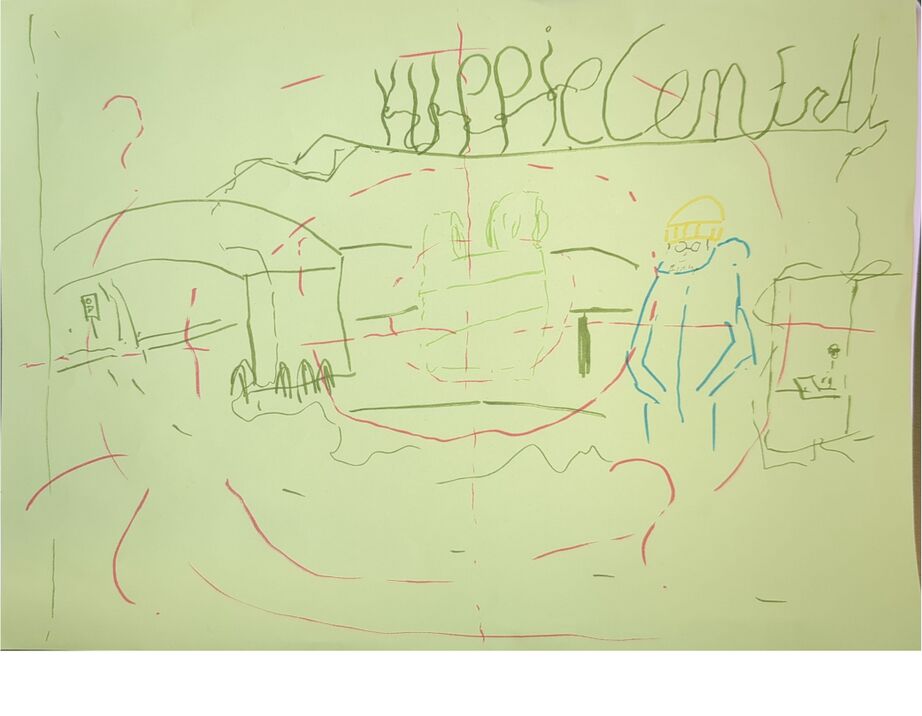
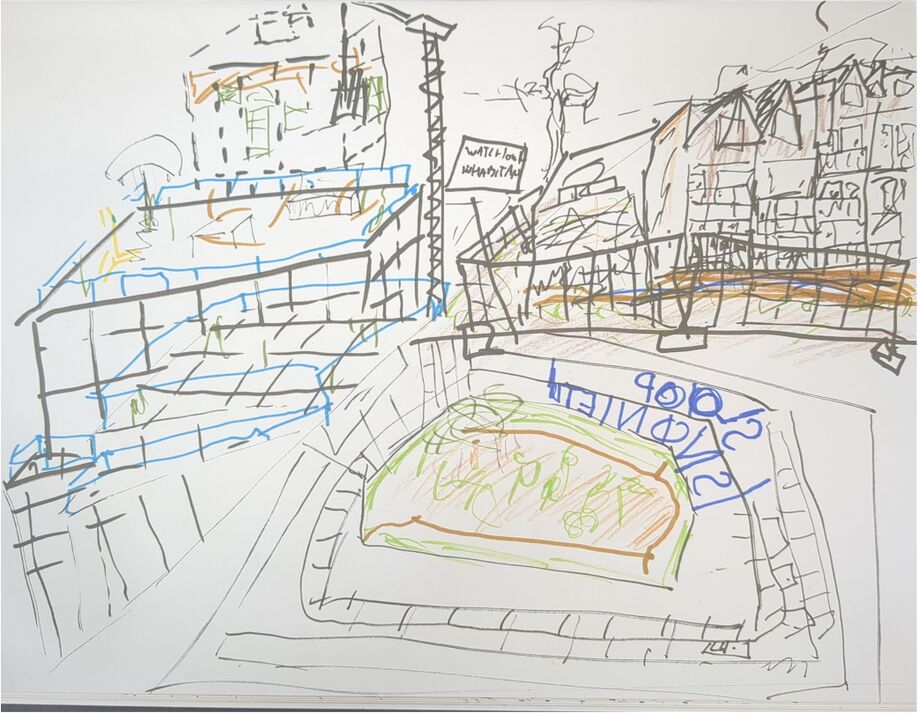
DRAWINGS FOUR TO NINE. Constant's A Cane, Sticky Notes, Another Body, at Dr Guislain Museum - Psychiatric Hospital, Ghent]
In this drawing, I stand on the tile / level that is being shown as the pragmatic meeting the context and the nuance. In the drawing, coming from one side, there is the familiar barrier of family that is meaning to help. With the best intentions. But at the same time coming from the idea of what I call VINEXWIJK TUNNELVISION. By this, I mean that there is a certain normalcy or set of ground rules in which they are situated. It is a certain perception where they actually do care when they are speaking to us, but the care and interest dissolves at the moment they continue their lives. [please clarify, who are "they" here?] To be clear, I am not holding them accountable of that whereas I would like to see a bit more self awareness in that. If you feel comfortable in the bubble of a nuclear family in the new town of Spijkenisse. Be my fuckin guest as long as you are happy.
But what recently happened is that these relatives project and somewhat enforced their normalcy towards me. And that is hitting to the core of where this frustration comes from. The sense that I need to fit into this household and camouflaging that as a way of caring about me. In the same sense they actually do care and say wisdom tiles [why "tiles here?]and postcard-like greetings like here for you. Whilst there vision completely passes our situation and doesn't really help.
And on the other side of trying to find ways to explore accessibility, disability interface and going to a space in Ghent. Where in the first place it seemed to be an amazing experience of new insights and to develop the project.
From the 2nd-7th of December 2024, I participated in Constant's A Cane, Sticky Notes, Another Body work session. In SI24, Martino Morandi suggested me to sign up for the week. As I am fully immersed into the subject of (in)access, (in)affordability and (dis)ability. This week purely spoke to me so I was glad to be selected. To illustrate, here are some notes and drawings of the week.
Monday: Introduction rounds: names, pronouns etc. Week overviews were shared and emails given. We had some rooms in usage. The first main room was a Theater Space in which we were for 2 days. The second main room was on floor 1. We had a salon and also a soft space in the attic.
Tuesday:
artist presentation about works concerning ableism. Buzzwords: Cripping the Space, Engagement Arts. Artist presented a very intense work which were compressed interviews on ableist experiences in the arts in the shape of Testimonies. Very relatable stories. Afterwards, presented privilege checklist and tools. Which seemed like some sort of manifesto in the shape of a checklist.
"Checklist of what, as disabled, I can expect from institution, checklist of what, as non-disabled, should be aware of in the institution
One thing I asked at some point was based on a bullet point on this checklist
Ik hoef bezoekers of personeel niet te onderrichten over structureel validisme. (I don't have to educate other people about structural valid-ism)
Some parts of this checklist were relatable but towards this point. "Don't you want to bridge the gap of knowledge? Why?" The answer was that she did not want to be an expert giving have to be an expert in disability / accessibility practice without getting paid for it. there was a weird feedback session which resulted into a feedback, giving negative feedback to the person without them being there.
Inclusivity cannot be tackled via a list of bullet points Disability and coloniality in the Belgian context? Belgium amputated Congolese people if they did not comply with unrealistic production goals. Currently coloniality is doing this again The Gaza Sunbirds are a team of cyclists from Gaza who brought attention to the fact that coloniality/Genocide creates disability.
From this moment I felt that the conversation went out of focus, at least for me. I don't want to invalidate the topics mentioned above. But I was there for the sake of disability / accessibility, whereas above mentioned examples were more concerned with inclusivity, identity politics and geopolitics. Which are all very valid problems with a huge urge [motivation?]. But this approach dominated the rest of the week.
Wednesday
What is Yassification?
there was a talk from someone about feminist publishing, theory, tools and such. Very intriguing. Artist felt a bit like a performative stereotype, wearing and pronouncing their cosmic colours in this environment of a safe space. I´m not a big fan of the 🌌🔮 💖🌟💫✨ 'Yassification' ✨💫🌟💖🔮🌌 of institutional critique with such spirituality/astrology based emoji's. I am not into this, I don't want to talk about it, but considering my experiences with these certain coping spiritualities I needed to really look past this. Artist did a presentation based on the diversity of lives and bodies. Concerning the meditation, Focussing on the last paragraph:
Maybe you need energy ... confidence ... maybe you need care, self-care ... maybe you need courage ... joy ... calm ... time for yourself and your peers ... slowing down ... going faster ... finding your own rhythm ... maybe you need to burn patriarchy, take down colonial statues, flatten inaccessible staircases, eat the rich, shout, cry ... maybe you need to rest ... maybe you need support, space, a holiday, a break ... maybe you need to stop ... for a while ... maybe you need to be here, there, then ...
This broke my meditational focus/. I am familiar with (guided) meditations both YouTube 'guided meditation to help you relax, sleep' sense or (za)zen meditations. At some point the maybe you want to burn down the patriarchy. Felt like the pushing of the same narrative that was there on Tuesday. I commonly have an issue with these narratives creating a portal to an ideal interface. I like to maintain the autonomy in my imagination. In YouTube essayist Dr Bitchcraft's video The oversimplification of feminism [video], she talks about idea of this yassified institutional critique is
Ideal futures are of course with dissolved power structures and no war and all. But for me ideally, my honest grief point of view. Ideal would be that my father would have lived for another 20 years to enjoy his retirement. But he can't. This sugar coated storytelling is just a bit frustrating and I from that moment started to feel even more frustrated.Part 2 of the day, we spent on 'institutes' and their access challenges / potentials. Finally, something that relates to what I signed up for. It was alright, my focus was starting to diffuse into tired numbness the end of the day. This is where I realised, my coordinate is not where the other topics were about.
Thursday I expressed my frustrations. It was heard, we went in groups and workshops vernacular technologies. hetalks were about things considering anarchism and accessibility; how during covid both regulations but also protest movements had a sense of ableism. In general, I started the day feeling that I had some input. But in the end of the day it went on about ways of 'how to deal with the amount of ranting, venting, complaints' and then named some ticketing / server-based talking and it got basically no to laughed at response. :") I resulted in silence and in the end it became this gaslight bingo from negative to positive things. 'Salty / gaslight / small wins' and if you have bingo. then a 'playlist' starts playing (???)
Friday was about speculative scenarios based on different elements, playing the *SPLINT game + Techno Vernacular Degrowth Afterwards there was a feedback moment. Niek Hilkmann said: I felt very well taken care of, food was great and so was housing; felt very welcomed. content wise a little bit lost sometimes. Expected a bit mmore of a dialogue with the museum workers which was a shame because he was very much interested in what was going on here. That resulted in Niek taking more of a stand back today and going more to the Museum
I felt the same way, Same - in a way, very much interested in access & disabilities and - not so easy to discuss here, even though he was interested in most discussion; (different coordinates but 'on the same spectrum')Very nice conversations, good insights from other people around so it was a success. But existential question of what he was doing here. Have these narratives, [been] really helpful, [can I use them] in [my] graduation project. How different POV towards psychiatric institutions - having the conversations here and meeting people who live here, having this tension of this feeling, uncomfort & discomfort - not in a bad way, felt inspiring.
And that basically narrows down my annoyance towards this week. I have some new resources, thoughts. But I wanted to go home really bad instead of staying in this echo chamber.
Saturday I was happy to go home, it was weird, it was great, inspiring. But I was just done. I haven't made anything, brainstormed a whole week.
Reflections on Ghent
The accessibility / disability struggles are something that are difficult to get around in. As my brother and mother deal with some things that are beyond their reach or control. I sometimes feel that I'm impaired by their disabilities. I can't help them more than I can, but I do feel affected by the situations and misery and troubles that come with it.
It is difficult, because I can not really put my head in the sand, my own diagnoses sometimes makes it hard to cope with their troubles. The diagnoses I'm talking about are ADHD and PDDNOS.[17]
Because when I search for support. Of course I talk with friends and they are fully supportive. With other close family, I just feel they make things worse without having the intention of because of their normalcy through the demographic tunnel vision of living in a vinex [18]wijk. Which is a certain perspective that coordinates in a completely different way of dealing with problems, as portrayed in the previous chapter.
So then I go to Ghent for a week of what I hoped to be progressive and critical thinking concerning virtual/physical interfaces. [19] which was truly interesting and inspiring but the main narratives aims to topics in the sense of(typical cultural academic topics like) inclusivity, geopolitical struggles, colonialism, patriarchy and identity politics.
Although I agree with the importance of discussing the above topics. It still distracted the narrative.
I signed up for the event because I wanted to do something that means something in relation to my experiences with the topic. We were situated in a space that felt familiar to me. The Dr Guislain museum / mental health institution / rehab facility deals with ideas of illness, sickness and so on.
The project week recurred [descended?] into (from my perspective) discussions that felt rather escapist, of course there is truth in relating disability practice towards the contemporary problems of the world, but that doesn't mean the things in our close surroundings aren't still happening.
It would have been great to have gained insights from either people that are in treatment (which is a huge step for someone to make) but also the professional workers and other facilitators that focus on helping people get better or at least to make their lives a bit better.
There were a few moments when people talked about 'identifying as disabled' which is also a trend that I can't get around. I have been walking and coping with my diagnoses that shape who I am. But saying that I am a neuro a-typical, lung infection with balance problems is something that makes me laugh out loud.
It feels like some sort of modern day privilege to identify as your condition. As a comic sketch that comes to mind, that people have learned these words from pop culture and then say to someone that can barely function because of the conditions that they have, that this new person identifies as disabled and then just goes around telling other people just how disabled they are.
And to close this term, a recent internet finding was that this online (self)diagnosis obsession results into a blend of popular social media trends into one. There are now collective thought streams going around, navigating symptoms based on astrology. So that the place and time where and when you are born, define your conditions.
So in this case the threshold on both progressive in-fighting and conservative close families are something that does not exactly help me or us get around in our surroundings.
[What is next? A drawing.. of? How did the experience in Ghent inform the way you want to pursue the project, in practical, positive, terms? (in a couple of sentences). This will provide the lead into the next chapter]
https://www.rijnmond.nl/nieuws/1930343/vervoerder-trevvel-spant-kort-geding-aan-tegen-gemeente-rotterdam-we-maken-ons-grote-zorgen
https://www.government.nl/topics/care-and-support-at-home/social-support-act-wmo
https://www.rotterdam.nl/wonen-leven/vraagwijzer
https://www.trevvel.nl/trevvel-sociaal/uit-thuis-agenda/
https://www.verwijswijzer.nl/rotterdam/hulpmiddelen-en-aanpassingen/aanvullend-openbaar-vervoer.html
https://openrotterdam.nl/directeur-miniworld-woest-nadat-senior-klant-drie-uur-moet-wachten-op-taxi/
https://www.rijksoverheid.nl/onderwerpen/zorg-en-ondersteuning-thuis/wmo-2015
https://www.trevvel.nl/doelgroepenvervoer/trevvel-samen/
https://www.government.nl/topics/care-and-support-at-home/social-support-act-wmo
https://www.rotterdam.nl/wonen-leven/vraagwijzer
https://www.trevvel.nl/trevvel-sociaal/uit-thuis-agenda/
https://www.verwijswijzer.nl/rotterdam/hulpmiddelen-en-aanpassingen/aanvullend-openbaar-vervoer.html
https://openrotterdam.nl/directeur-miniworld-woest-nadat-senior-klant-drie-uur-moet-wachten-op-taxi/
https://www.rijksoverheid.nl/onderwerpen/zorg-en-ondersteuning-thuis/wmo-2015
https://www.trevvel.nl/doelgroepenvervoer/trevvel-samen/
- ↑ an infrastructure for counter-mapping / anti-campaigning by showing (human) complications
- ↑ Unity3D, Cinema4D, Unreal Engine
- ↑ Manoeuvre meaning, a movement or series of moves requiring skill and care or carefully guide or manipulate someone or something in order to achieve an end.
- ↑ My mother also uses a mobility scooter because she can not walk long distances, she also has arthritis and joint pain).
- ↑ Jump up to: 5.0 5.1 A customized transport company, name is pronounced as travel but written in phonetic Dutch. https://www.trevvel.nl/over-trevvel/
- ↑ Mantelzorg means cloak care in Dutch. The term was introduced by Johannes Hattinga Verschure in 1972. It describes the system of informal social care in the Netherlands. Informal care is the care for chronically ill, disabled and needy by relatives, friends, acquaintances and neighbours.
- ↑
- ↑ Trevvel Samen is basically 'traveling together'. You can apply for Trevvel Samen if you have an illness, handicap or of an age that public transport becomes impossible to use. It is a social taxi service that picks you up and delivers you to where you need to be.
- ↑ When you are in either Wet Langdurige Zorg (Long-term care act) [1] or Wet Maatschappelijke Ondersteuning (social care act) [2] it takes longer (so to 8 weeks) to process your application. https://www.verwijswijzer.nl/rotterdam/hulpmiddelen-en-aanpassingen/aanvullend-openbaar-vervoer.html
- ↑ (Fill in a form, call 14010 or visit a location.) https://www.rotterdam.nl/en/contact
- ↑ located at 51.92983779151647, 4.458618083805808
- ↑ located at 51.93351819907188, 4.4992117838060155
- ↑ located at 51.84548747796849, 4.351767508936801
- ↑ Mother, brother, me.
- ↑ Myoclonus is a type of uncontrollable movement that includes sudden, brief involuntary twitching, jerking, or spasm of a single muscle or a group of muscles. A person experiencing myoclonus cannot control it. Myoclonus is the word for the movements themselves. It is not a disease itself, but may be a sign of another neurological condition. https://www.ninds.nih.gov/health-information/disorders/myoclonus
- ↑ Locate at 51.942295527295805, 4.462758077714551
- ↑ "PDD-NOS stands for Pervasive Developmental Disorder-Not Otherwise Specified. PDD-NOS was one of several previously separate subtypes of autism that were folded into the single diagnosis of autism spectrum disorder (ASD) with the publication of the DSM-5 diagnostic manual in 2013. In the past, psychologists and psychiatrists often used the term “pervasive developmental disorders” and “autism spectrum disorders” (ASD) interchangeably. As such, PDD-NOS became the diagnosis applied to children or adults who are on the autism spectrum but do not fully meet the criteria for another ASD such as autistic disorder (sometimes called “classic” autism) or Asperger syndrome. Like all forms of autism, PDD-NOS can occur in conjunction with a wide spectrum of intellectual ability. Its defining features are significant challenges in social and language development. Some developmental health professionals refer to PDD-NOS as “subthreshold autism." In other words, it’s the diagnosis they use for someone who has some but not all characteristics of autism or who has relatively mild symptoms. For instance, a person may have significant autism symptoms in one core area such as social deficits, but mild or no symptoms in another core area such as restricted, repetitive behaviors." https://www.autismspeaks.org/pervasive-developmental-disorder-pdd-nos
- ↑ Vierde Nota Ruimtelijke Ordening Extra"; Fourth Memorandum on Extra Spatial Planning (src will be added)
- ↑ https://constantvzw.org/site/Open-call-Worksession-a-Cane-Sticky-notes-Another-body.html

